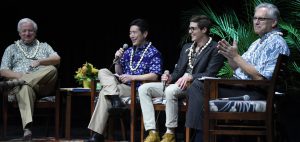 The program for the 2017 Maui Energy Conference is taking shape to explore a vibrant and clean energy future. Local, national, and international experts will tackle the following topics:
The program for the 2017 Maui Energy Conference is taking shape to explore a vibrant and clean energy future. Local, national, and international experts will tackle the following topics:
DAY 1
Resilience
How do we define resilience and sustainability? What do these look like? What strategies will get us to an energy system that is resilient? The challenge of achieving decarbonized energy production and maintaining a reliable, safe, affordable, secure and resilient energy system is formidable.
Water, Energy, Food Security Nexus: Connecting the Dots
We explore the nexus between agriculture production, use of water, and production of energy. With the closure of Hawaii’s last sugar plantation, what role will agriculture play in energy resilience? What are the possibilities for locally produced Biomass and Biofuels? What are the trade-offs in potential food security vs. energy security? In a global marketplace is food or energy security a myth?
Emerging Trends in Hawaii Energy Policy: Are We Sending Mixed Messages?
What market signals are policy makers sending to energy stakeholders? Is it possible to stabilize energy prices and electricity rates, reduce carbon emissions, and provide reliable, safe, affordable, and resilient energy all at the same time? What measures will policy makers implement to protect vulnerable populations?
Emerging Trends in Energy Policy: Nuclear Energy – Old Peril or New Promise
What are the social, cultural, legal, and economic challenges of decarbonization using nuclear energy? Does nuclear energy have a role in Hawaii’s energy future? We will present a critical discussion to address community concerns and fears regarding nuclear energy.
HNEI/GE Update on Renewable Energy Deployment
Hawaii Natural Energy Institute has engaged GE for over a year to address the effects on grid resiliency as Hawaii moves toward 100% renewable energy deployment. The presentation will update us on critical findings and mitigation measures that must be considered. What happens to system operability and reliability? What types of ancillary services will be required?
DAY 2
Creating a Resilient Energy Economy
What are the effects of shifting to a decentralized energy system? What are the impacts on jobs? What opportunities exist to incubate and commercialize new innovative energy entrepreneurs? Can innovative energy rate design and pricing help build a strong economy? How can tax policy and commercial incentives aid in this transition?
Technology: Is Storage the Key to Resilience?
We will discuss specific storage technologies and their contribution to resiliency. Are these systems ready for deployment and cost effective? Do they provide more than one function on the grid? Can customers provide support for their own electrical needs through storage, especially in a Distributed Energy Resources (DER) scenario?
Technology: Role of the Smart Grid
How will the “smart grid” add to grid stability and resiliency? Will the “smart grid” increase exposure to security breaches and what mitigation measures are needed to reduce risk? How can we secure customer’s personal information, including energy usage patterns?
Technology Panel: Innovations in Transportation
What steps can be taken to create and facilitate a resilient transportation sector? Are there unique issues for islands? What are the challenges and expectations in creating a resilient system? What are the costs/benefits of hydrogen, biomass and other alternatives?
Mobility: Getting a Move On
Air, ground, and marine transportation represents more than two thirds of the fossil fuel consumption in Hawaii. We will explore and discuss the opportunities and challenges in the transportation sector. What role can land use and urban planning play in reducing reliance on fossil fuels? What companies are leading in this area? What opportunities are there in the electrification of ground transportation?
The program includes keynote speakers, a session featuring case studies as well as plenty of time for viewing the exhibits and networking.
